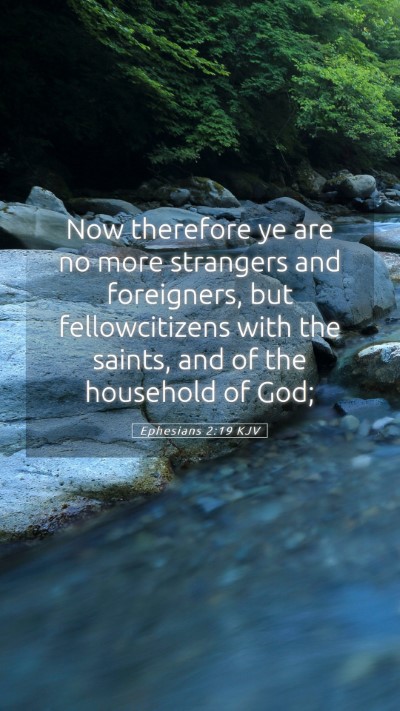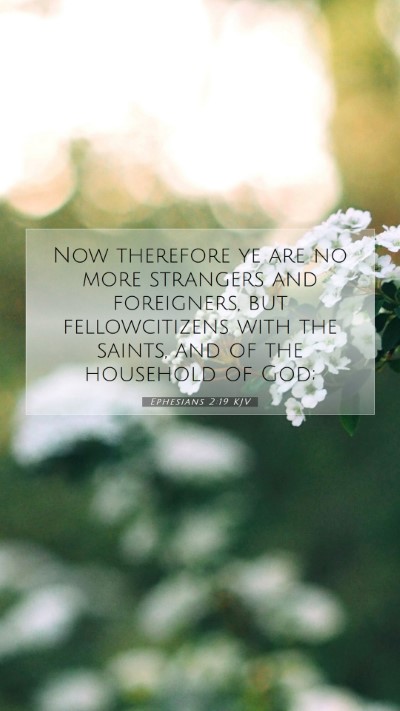Ephesians 2:19 - Understanding the Verse
Ephesians 2:19 reads: "Now therefore ye are no more strangers and foreigners, but fellowcitizens with the saints, and of the household of God;" This verse carries profound meanings, which can be unpacked through various perspectives from public domain commentaries.
Overview of Ephesians 2:19
In this verse, the Apostle Paul articulates the transition of believers from a state of spiritual alienation to one of inclusion and belonging in the family of God. Here, we explore several interpretations and understandings derived from notable biblical commentators.
Insights from Matthew Henry
Matthew Henry's Commentary emphasizes the transition from being a stranger to becoming a fellow citizen. He notes that this transformation is not merely a change in status but embodies the essence of spiritual kinship with Christ. The phrase "household of God" indicates that believers are now part of a divine family, marked by fellowship and mutual responsibility.
Insights from Albert Barnes
Albert Barnes' Notes on the Bible delve into the implications of "fellowcitizens with the saints." He emphasizes that this signifies unity among believers, irrespective of their previous distinctions—whether Jew or Gentile. In Christ, believers share a common heritage and purpose, which fosters a sense of community within the Church.
Insights from Adam Clarke
Adam Clarke's Commentary adds depth by discussing the relevance of citizenship in the context of ancient Israelite and Roman cultures. He explains that being a citizen of God's kingdom elevates one's status far beyond earthly citizenship, granting access to divine privileges and responsibilities.
Key Themes and Applications
- Belonging: The verse reassures believers of their acceptance and belonging in God's family.
- Unity: It emphasizes the equality among believers as fellow citizens, which is vital for harmony within the church.
- Identity: Spiritual identity is anchored in belonging to God's household, shifting the emphasis from worldly identities to spiritual ones.
Related Bible Cross References
- Galatians 3:26-28: Highlights the unity of believers in Christ, transcending racial and social barriers.
- Philippians 3:20: Affirms that believers are citizens of heaven, further emphasizing their spiritual citizenship.
- 1 Peter 2:9: Describes believers as a chosen generation, royal priesthood, and a holy nation, reinforcing their special status in God’s eyes.
Conclusion
Through Ephesians 2:19, we gain a deeper understanding of Scripture and the transformative power of faith in Christ. It serves not only as an affirmation of our identity in God's family but also as a call to live in unity and fellowship with one another. This verse is thus crucial for any Bible study groups or online Bible study sessions aimed at exploring themes of belonging and community within the Christian faith.
Further Study Suggestions
- Bible Study Guides: Explore guides that help in understanding the Pauline Epistles for broader context.
- Online Bible Study Courses: Consider courses that focus on the themes of unity and identity in Christ.
- Bible Study Topics: Delve into topics such as "The Church as a Family" and "Citizenship in Heaven."


